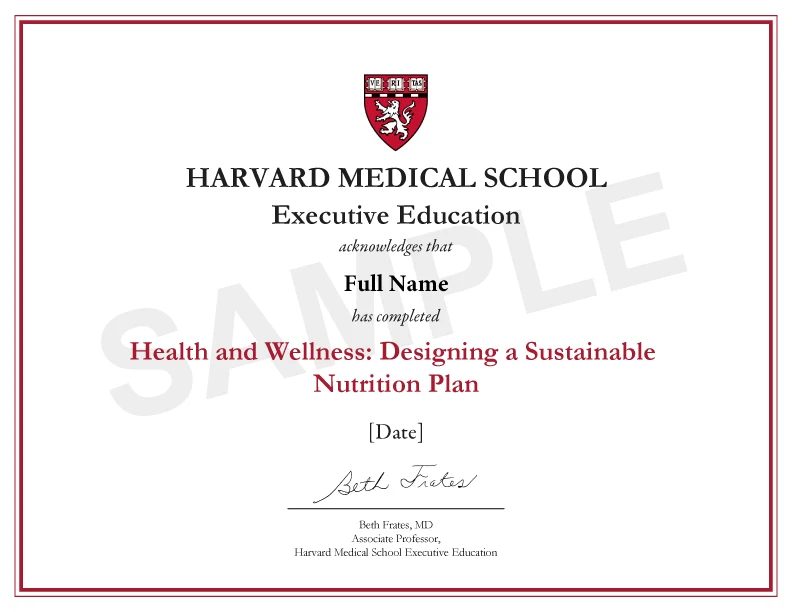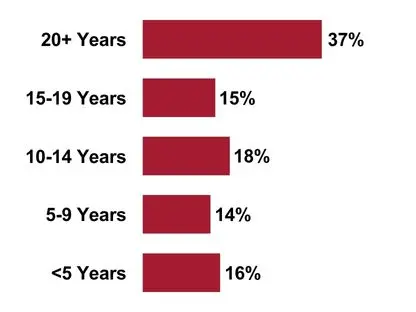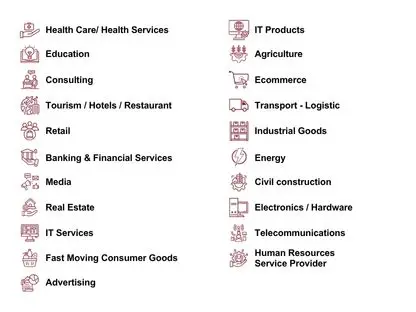Health and Wellness: Designing a Sustainable Nutrition Plan
Key Takeaways
Examine the connection between a healthy lifestyle and disease and chronic conditions.
Apply the five-step collaborative cycle to motivate and empower clients to adopt and sustain healthy behavioral patterns.
Identify evidence-based guidelines for healthy eating patterns and explain why certain foods are health-promoting.
Understand the six pillars of lifestyle medicine and explain their dependencies on one another to achieve sustained wellness.
Create a plan for behavioral change that starts a joyful journey to adopt and sustain healthy practices through all life stages.
Apply a growth mindset, self-compassion and internal motivators to implement a plan for sustained behavioral change.

"If we look around the country, look at the statistics, the clear indication is that most Americans are eating in a way that is having many adverse effects on their health. Health coaches can provide people with information that’s critical, but more than that, they can give them a hand to help them put into practice choices that can have a powerful influence on their health and wellbeing."
- Walter Willett, M.D.
Professor, Harvard T.H Chan School of Public Health and guest speaker
Who is This Program For?
Health and Wellness: Designing a Sustainable Nutrition Plan is designed for individuals and wellness industry professionals who want to differentiate themselves with an evidence-based understanding of nutrition, lifestyle medicine and behavior change for sustained wellness.
Health coaches who seek to elevate their practice with the tools and confidence to inspire clients to make informed decisions based on unique needs and goals
Careers such as nutritionist, dietician, health coach, lifestyle coach, wellness advisor and CEO, founder or owner of a health-based organization
Personal trainers and fitness instructors who want to better understand the relationship between food, lifestyle and exercise to better motivate sustainable behavioral changes in clients
Careers such as personal trainer, yoga instructor, fitness instructor and fitness coach
Clinical health care professionals who seek a deeper understanding of the relationship between food and nutrition and how to educate patients on sustainable behavioral changes
Careers such as nurse, physician, physical therapist and mental health counselor
Health enthusiasts with a passion for developing and maintaining lifestyle strategies for themselves or others to live better, longer lives
Individuals interested in subjects such as cooking, organic food, veganism, vegetarianism, self-care, nutrition and health and wellness
Learning Experience

Lifestyle journey guidebook assignments to help apply learnings

Interactive activities and exercises

Curated handouts and supplemental resources

Insights on nutrition from a leading researcher

Evidence-based models for wellness

Fully online, cohort-based learning

Featured guest speakers

Networking with global peers

Certificate of completion from Harvard Medical School Executive Education
Curriculum

Your Healthy Lifestyle Journey: A Guidebook for Health Coaches
Your Healthy Lifestyle Journey is a learner’s reflective guidebook leading to a plan. It includes weekly required reflections that culminate in a plan for healthy lifestyle choices supported by reflective exercises and activities. This also serves as a guide and resource for future use by health coaches and enthusiasts.
Participant Testimonials
Faculty

Associate Professor, Harvard Medical School
Beth Frates, MD, FACLM, DipABLM, is a trained physiatrist and a health and wellness coach with expertise in lifestyle medicine. She has received several teaching accolades fro...
Featured Guest Speakers

Professor, Harvard T.H. Chan School of Public Health
Dr. Walter Willett is a physician and epidemiologist well known for his work in creating the Harvard Healthy Eating Plate. He is professor of epidemiology and nutrition at the...

Bariatric Program Manager, Brigham and Women's Hospital
Meghan Ariagno, MBA, RD, LDN, has been working as a dietitian in weight management for over 12 years, contributing expertise on health coaching in a health care setting. She s...

Certificate
Upon completion of this program, you will receive a digital certificate from Harvard Medical School Executive Education.
Nutrition and Wellness Coaching program
FAQs
Didn't find what you were looking for? Write to us at learner.success@emeritus.org or Schedule a call with one of our Program Advisors or call us at +1 315 284 5718 (US) / +44 204 538 5575 (UK) / +65 3129 7741 (SG)
Early registrations are encouraged. Seats fill up quickly!
Flexible payment options are available.
Last Day To Enroll



